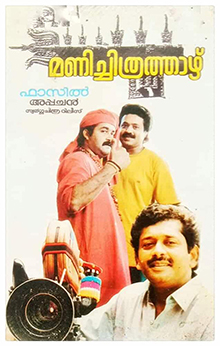
Back মণিচিত্রতজু Bengali/Bangla Manichitrathazhu Welsh قفل زینتی Persian Manichitrathazhu French Manichitrathazhu ID മണിച്ചിത്രത്താഴ് (ചലച്ചിത്രം) Malayalam Сломанный замок Russian மணிச்சித்ரதாழ் Tamil
| Manichitrathazhu | |
|---|---|
 Theatrical release poster | |
| Directed by | Fazil |
| Written by | Madhu Muttam |
| Produced by | Swargachitra Appachan |
| Starring | |
| Cinematography | |
| Edited by | T. R. Shekar |
| Music by |
|
Production company | |
| Distributed by | Swargachitra |
Release date |
|
Running time | 157 minutes |
| Country | India |
| Language | Malayalam |
| Box office | ₹7 crore |
Manichitrathazhu (transl. The Ornate Lock) is a 1993 Indian Malayalam-language epic psychological horror film directed by Fazil, written by Madhu Muttam, and produced by Swargachitra Appachan.[1] The film stars Mohanlal, Suresh Gopi and Shobana in addition to Nedumudi Venu, Innocent, Vinaya Prasad, K.P.A.C.Lalitha, Sridhar, K.B. Ganesh Kumar, Sudheesh, Thilakan and others in supporting roles.[2] The story is inspired by a tragedy that happened in an Ezhava tharavad, the Alummoottil meda (an old traditional mansion), located at Muttom (near Haripad), belonging to a central Travancore Channar family, in the 19th century.[3] The writer of the film, Madhu K Panicker or Madhu Muttam, is a member of the Alummoottil Tharavad.[4]
Directors Sibi Malayil, Priyadarshan and Siddique–Lal served as the second-unit directors.[5] The cinematography was by Venu, Anandakuttan and Sunny Joseph served as the second-unit cinematographers, the film was edited by T. R. Shekar. The original songs featured in the movie were composed by M. G. Radhakrishnan, while the original score was composed by Johnson. The film won the National Film Award for Best Popular Film Providing Wholesome Entertainment and Shobhana was awarded the National Film Award for Best Actress for her portrayal of Ganga / Nagavalli.[6][7]
The film dealt with an unusual theme which was not common in Indian cinema at the time.[8] The film completed 300 days of run in many theatres.[9] Manichitrathazhu was remade in four languages – in Kannada as Apthamitra which in turn was remade in Tamil as Chandramukhi (with some plot changes), in Bengali as Rajmohol and in Hindi as Bhool Bhulaiyaa – all being commercially successful. Geethaanjali, a spin-off directed by Priyadarshan and Mohanlal reprising the role of Dr. Sunny Joseph was made in 2013. Manichitrathazhu is considered by many critics as one of the best films ever made in Malayalam cinema and developed a cult following in the years after its release.[10][11] It is often regarded as the best psychological thriller ever made in India.[12]
- ^ "Made in Malayalam". The Times of India. 6 March 2016. Archived from the original on 22 September 2016. Retrieved 9 July 2016.
- ^ "High five". The Hindu. 16 June 2016. Archived from the original on 11 July 2023. Retrieved 9 July 2016.
- ^ Social Mobility in Kerala: Modernity and Identity in Conflict. Pluto Press. 2000. p. 264. ISBN 0-7453-1693-X. Archived from the original on 11 July 2023. Retrieved 14 December 2020.
{{cite book}}:|work=ignored (help) - ^ "'Romancham' to 'Manichitrathazhu': Horror films based on real events". The Times of India. ISSN 0971-8257. Retrieved 25 August 2023.
- ^ Nair, Sree Prasad (22 April 2016). "4 Mohanlal film remakes that Akshay Kumar owned". CatchNews.com. Archived from the original on 8 January 2020. Retrieved 6 February 2020.
- ^ "30 years on, 'Manichitrathazhu' still a blockbuster at Keraleeyam!". Onmanorama. Retrieved 19 February 2024.
- ^ Staff, T. N. M. (4 November 2023). "Thirty years later, Manichitrathazhu has 2000 people waiting in queue for four hours". The News Minute. Retrieved 19 February 2024.
- ^ "Of Bhool Bhulaiya, and a classic dumbed down". Rediff.com. 16 October 2007. Archived from the original on 27 June 2014. Retrieved 24 May 2013.
- ^ George, A. B. (14 April 2020). "Highest Grossing Malayalam Movies (Year 1980–1999)". FilmBiopsy. Archived from the original on 3 October 2022. Retrieved 30 September 2022.
- ^ "Best Malayalam Movies: 10 Malayalam films to watch before you die". The Times of India. Archived from the original on 10 June 2021. Retrieved 10 June 2021.
- ^ "Shobana reminisces on impact of Manichitrathazhu on film's "27 birthday"". The Times of India. 22 December 2020. Archived from the original on 10 July 2021. Retrieved 8 July 2021.
- ^ "India's 'best' psychological thriller turns 25". The Week. Retrieved 19 February 2024.